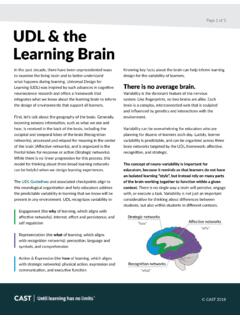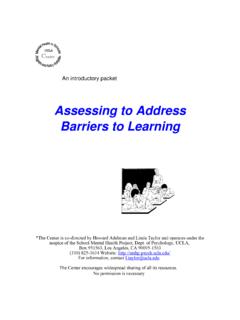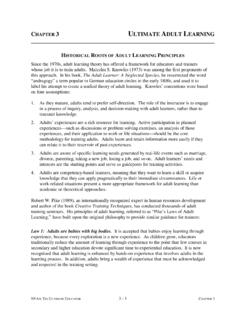Transcription of The Nature of Learning - OECD
1 How can the Learning sciences inform the design of 21st centur y Learning environments? Innovative Learning Environments Project The Nature of Learning Using Research to Inspire Practice Edited by Hanna Dumont, David Istance and Francisco Benavides Practitioner Guide from the Introduction Over recent years, Learning has moved increasingly centre stage and for a range of powerful reasons. A primary driver has been the scale of change in our world the rapid advances in ICT, the shift to economies based on knowledge, and the emphasis on the skills required to thrive in them. Schools and education systems around the world are having to reconsider their design and approach to teaching and Learning .
2 What should schooling, teaching and, most especially, Learning look like in this rapidly changing world? At the same time, empirical research on how people learn, how the mind and brain develop, how interests form, and how people differ in all these has expanded tremendously. This science of Learning underscores the importance of UHWKLQNLQJ ZKDW LV WDXJKW how it is taught, DQG KRZ OHDUQLQJ LV DVVHVVHG The Learning sciences are importantly enriching our understanding of how people learn best, and showing that many existing school Learning environments are in direct contrast to this. Classrooms, schools and education systems cannot change overnight but neither is it possible to accept arrangements that are in direct contrast to what makes for good Learning .
3 If instead WRGD\ V schools were designed to leverage knowledge about Learning WRPRUURZ V JHQHUDWLRQ ZLOO more likely become the powerful learners, skilled workers and engaged citizens we want them to be. The OECD project Innovative Learning Environments has sought to provide material to help to do this. It has put together a volume called The Nature of Learning : using research to inspire practice, which is based on extensive research findings on different aspects of Learning and applications. It provides a powerful knowledge base for the design of Learning environments for the 21st century. This booklet is a summary of The Nature of Learning , created to highlight the core messages and principles from the full report for practitioners, leaders, advisors, and policy-makers indeed, for anyone interested in improving the design of Learning environments.
4 The principles outlined serve as guides to inform everyday experiences in current classrooms, as well as future educational programmes and systems. This summary LV LQWHQGHG DV D SUDFWLWLRQHU JXLGH but for the full account and explanation please refer to the original publication. O E C D This document includes: page: The Fundamentals of Learning 3-5 The 7 Principles of Learning 6-7 Key Shifts in the 21st Century 8-9 Building Blocks for Innovative Learning Environments 10 Conclusions 11 2 The Fundamentals The l ear ni ng sci ences ar e a r i ch fi el d of r esear ch that has hel ped us to better under stand how we learn. Under standi ng the fundamental s of how we l ear n al l ows us to addr ess mor e effecti vel y the condi ti ons i n whi ch successful l ear ni ng can occur.
5 How People Learn During the 20th century, the concept of Learning underwent important developments. Today, the dominant concept is soci o-constructivist in which Learning is understood to be importantly shaped by the context in which it is si t uat ed and is acti vel y constr ucted through soci al negot i at i on with others. On this understanding, Learning environments should be where: Constructive, self-regulated Learning is fostered The Learning is sensitive to context It will often be collaborative Theoretical concepts do not yield concrete prescriptions for classroom application but good theory can be used flexibly and creatively by teachers in their planning and educational practice.
6 At the same time, not all Learning takes place in the classroom as much of it occurs at home, on sports fields, in museums, and so forth (non-formal Learning ), and sometimes implicitly and effortlessly (informal Learning ). Adaptive Expertise Many scholars agree that the ultimate goal of Learning and associated teaching in different subjects is to acquire adapti ve exper ti se the ability to apply meaningfully-learned knowledge and skills flexibly and creatively in different situations. This goes beyond acquiring mastery or routine expertise in a discipline. Rather, it involves the willingness and ability to change core competencies and continually H[SDQG WKH EUHDGWK DQG GHSWK RI RQH V H[SHUWLVH.]]
7 It is therefore central to lifelong Learning . There are different broad pedagogical approaches that can help to develop adaptive expertise: Guided Learning : the teachers take the main relevant decisions about the goals of Learning , Learning strategies, and how to measure outcomes, while taking care of feedback, judgements and rewards. Action Learning : the learners play a much more active role in determining the objectives of the Learning than in guided Learning ; there is a strong element of learner self-organisation and self-planning. Experiential Learning : this is not controlled by teachers and there are no predetermined objectives. What is learned is determined by context, learners PRWLYDWLRQs, the others with whom they come in contact, discoveries made, etc.
8 It is a by-product of the activities in which people are involved. L earning of 3 In order to support the progressive acquisition of adaptive expertise, there must be a balanced, integrated use of all three approaches. Such a balance should allow for structure and guidance by the teacher and it should create space for substantial self-regulated and self-determined Learning . It should leave RSHQ RSSRUWXQLWLHV IRU H[SUHVVLYH RXWFRPHV unanticipated results from the Learning that takes place in a variety of situations outside schools and classrooms. iStockphoto/Robert Churchill The Gatekeepers of Learning : Emotions are the primary gatekeeper to Learning .]
9 Emotion and cognition operate seamlessly in the brain to guide Learning . Positive emotions encourage, for instance, long-term recall while negative emotions can disrupt the Learning process in the brain at times leaving the student with little or no recall after the Learning event. This has significant implications for teaching and Learning , whether negative emotional states are a result of classroom experiences or of experiences outside that are carried into the Learning environment by the student. Any debate about whether Learning institutions should be concerned about OHDUQHUV HPRWLRQs and their development is thus irrelevant as schools are responsible for cognitive development they inescapably already are.
10 Motivation ensures that students acquire knowledge and skills in a meaningful way. Like emotion, the presence of positive motivation towards a Learning task markedly increases the likelihood that students will engage in deep Learning . Helping students become aware of their motivation systems and how that influences their Learning leads to them becoming more effective learners. Teachers need to remain current with what their students are capable of achieving by monitoring their progress closely. Since teacher expectations have a significant impact on studentV achievements, those expectations need to be positive yet realistic.













